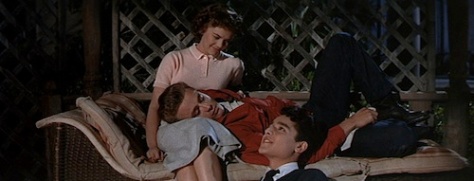By Dennis Hartley
(Originally posted on Digby’s Hullabaloo on April 12, 2014)

Grandmere du jour: On My Way
So if you have been staying away from theaters because you’re one of those folks who feels the majority of Hollywood product these days is just big, dumb, loud (in 3-D IMAX) and targeting sub-literate 12 year-olds, I have good news for you. Two (count ’em, two) eminently watchable flicks for grownups. Two films featuring fully fleshed out characters over 60…who are neither senile nor terminally ill (!).
(First up). I think smoking is a disgusting habit. But there’s something about a beautiful French woman puffing on a Gitane that makes it seem…how do you say? SoDamSexy. Consider Catherine Deneuve, who maintains her ageless allure even while taking up a chunk of screen time in Emmanuelle Bercot’s On My Way bumming cigarettes, scrounging for money to buy cigarettes, desperately seeking any place that sells cigarettes, and of course, chain-smoking cigarettes.
Deneuve is Bettie, an ex-beauty queen (Miss Brittany 1969!) turned restaurateur, who has actually been on the cigarette wagon, at the encouragement of her cashier (Claude Gensac) who also happens to be her mom. But Bettie is about to fall off the wagon. She has reluctantly inherited her family-owned eatery, which is operating barely above water.
Living with her overly-protective elderly mom further elevates Bettie’s stress level, and now she hears it through the grapevine that her lover has dumped her for someone else (“Some 25 year-old slut,” her mom informs her, unhelpfully adding, “…a beautician.”). Say…anybody got a smoke?
Suddenly overwhelmed by life in general, Bettie impetuously hops into her car Thelma and Louise-style and hits the road, with (as Chuck Berry once sang) no particular place to go. When she calls one of her employees a day or two later to assure everyone that she hasn’t gone missing, she finds out that her estranged daughter Muriel (Camille) has been desperately trying to reach her. Muriel has had a last-minute shot at an internship in Brussels, but can’t find anyone else available to take her precocious son (Nemo Schiffman, real-life son of the director) to his grandfather’s house in the country.
To the surprise of both her daughter and herself, Bettie agrees to do her the solid (despite the awkwardness of barely knowing her grandson and having never even met her daughter’s father-in-law). And so they are off on their adventures through pastoral provincial France.
While Bercot’s script (co-written with Jerome Tonnerre) doesn’t venture too far from the traditional road movie tropes (unexpected detours, episodic meet-ups with quirky characters, etc.) the film is buoyed by her intelligent direction and the ever-radiant Deneuve’s engaging performance. Cinematographer Guillaume Schiffman (OSS 117: Cairo, Nest of Spies, The Artist) nicely captures the sun-dappled beauty of central France for a pleasing backdrop.
It’s interesting, I finally got around to seeing Alexander Payne’s Nebraska recently; and I found On My Way to be strikingly similar. Both films examine an aging parent and an adult child coming to grips with an estranged relationship.
Granted, Deneuve’s sixty-something character is relatively “younger” and more sound of mind than Bruce Dern’s dementia-suffering octogenarian, but both of these protagonists need to embark on a meandering road trip before ultimately coming home (both literally and figuratively) to the realization that what they were really looking for was tucked away in the bosom of their family all along…unconditional love.

Just another happy couple: Duncan and Broadbent in Le Week-End
Among the Boomers, who are now finding themselves irrevocably “turning into their parents” and thereby forced to commit previously unthinkable acts (e.g., sheepishly flashing an AARP membership card for a senior discount, or maybe going out for dinner at 4pm) those who are married with children arguably face the most dreaded crossroads of all: The Empty Nest Years.
Personally, I wouldn’t know, being a barren bachelor, but you know…this is what I’ve heard. The kids all have moved away, and now here we are, staring at each other across the table thinking: “So…now what do we do for excitement?”
If taking a young lover or a new sports car is off the table, how about a weekend in Paris? That’s what English couple Meg (Lindsay Duncan) and Nick (Jim Broadbent) are banking on to spice things up for their anniversary. That is the setup for Le Week-End, an uneven yet absorbing effort from Notting Hill director Roger Michell and Sammie and Rosie Get Laid screenwriter Hanif Kureishi.
Meg and Nick, both academics, don’t appear overtly affectionate, but they seem comfortable with…whatever “it” is that they do have (like a well-worn yet cozy pair of slippers you won’t toss). However, once they run into an old colleague (Jeff Goldblum, playing the Ugly American to the hilt) and he invites them to a soiree at his upscale Parisian digs (swarming with French hipsters), the facade crumbles.
The film is marketed as a comedy, but Kureishi’s literate screenplay is darker in tone; closer to Harold Pinter or Edward Albee (at times, Nick and Meg are like a benign George and Martha). Still, Paris is gorgeous, Duncan and Broadbent give great performances, no shots are fired…and there isn’t even one car chase.











